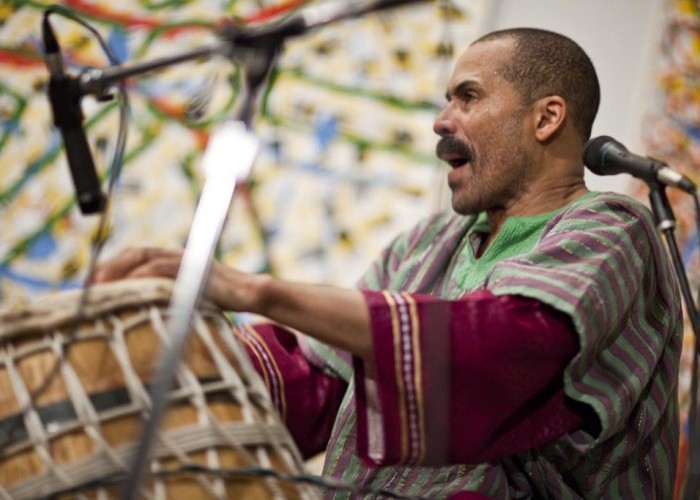Jan 13, 2026 2:09 PM
More Trump-Kennedy Center Cancellations
The fallout from the renaming of the John F. Kennedy Center for the Performing Arts to include President Donald…

Chicago percussionist and bandleader Kahil El’Zabar has a pair of recordings slated for release on Spiritmuse, a new UK imprint.
(Photo: Courtesy Spiritmuse)For more than four decades, percussionist Kahil El’Zabar’s vision has embraced tradition and the future, the local and global. A longtime student and proponent of African rhythms, he also draws on contemporary hip-hop and r&b. And while El’Zabar’s a consummate Chicagoan, he maintains a strong following in Europe as the new UK-based Spiritmuse Records is releasing two of his projects. El’Zabar’s Be Known: Ancient/Future Music features his long running Ethnic Heritage Ensemble, and the bandleader’s also teamed with a batch of jazz legends for Pocket Science.
El’Zabar took time to chat with DownBeat over the phone just before a recent set at New York’s Nublu.
The following has been edited for length and clarity.
What have been the most important things you’ve learned during the past 10 years?
The last 10 years have been an evolution for me in terms of hip-hop sensibilities and an interpretation of my groove.
Jazz usually acknowledges contemporary forms of expression and then incorporates them. Working with [trumpeter] Corey Wilkes, [bassist] Junius Paul, [keyboardist] Justin Dillard and all the guys I’ve worked with over the last 10 years—as they’ve grown up, I’ve grown playing in various contexts to adapt my communication to a contemporary urban viability.
I’ve learned more about less being more. A lot of older musicians would talk about less is more in how you’re able to acquire the sustenance and power of simplicity as a form of immediate communication. It’s essential no matter what the instrument is. And I can say confidently that no other percussionist sounds like me. It’s taken me a lifetime to gain a sense of unique individual statements about my instrument and approach, and the simplicity of how to capture that and express it.
Another thing I learned is the enormity of history within this music is a lifetime of references in order to redevelop your ideas.
That certainly is the case with the Ethnic Heritage Ensemble.
The master elder musicians don’t just propagate their own ideas on everything. They’re able to adapt to these experiences. In my case, Corey plays with a lot of hip-hop artists and r&b artists. [Saxophonist] Alex Harding was musical director for musical play Fela!, and has that African groove in his baritone and all the bop and avant-grade chops. [Cellist] Ian Maskin coming from a Russian background has Romanticism and conservatory training. At the same time, he can walk bass lines and understands jazz sensibilities.
Each person is bringing their personalities in a very individual way. My job is to find formulas of integration and interaction to develop a unique voice for our collective ensemble, collective sound.
Whereas on Pocket Science you’re working with an impressive group of veterans.
We’re such a youth-oriented culture in the modern world, it’s happening in the West and East. We forget that one of the most significant accomplishments is the benefit of getting older. And so, in earlier times in history, the idea of an elder was very appreciated, and the knowledge that came from that living experience was sought after.
So, between the four of us, we’ve played with anybody who has made statements in jazz. And we’re all still—for our ages—pretty youthful in terms of an excitement about making music and our openness to look at contemporary expressions along with the traditions.

Belá Fleck during an interview with Fredrika Whitfield on CNN.
Jan 13, 2026 2:09 PM
The fallout from the renaming of the John F. Kennedy Center for the Performing Arts to include President Donald…

Peplowski first came to prominence in legacy swing bands, including the final iteration of the Benny Goodman Orchestra, before beginning a solo career in the late 1980s.
Feb 3, 2026 12:10 AM
Ken Peplowski, a clarinetist and tenor saxophonist who straddled the worlds of traditional and modern jazz, died Feb. 2…

The success of Oregon’s first album, 1971’s Music Of Another Present Era, allowed Towner to establish a solo career.
Jan 19, 2026 5:02 PM
Ralph Towner, a guitarist and composer who blended multiple genres, including jazz — and throughout them all remained…

Rico’s Anti-Microbial Instrument Swab
Jan 19, 2026 2:48 PM
With this year’s NAMM Show right around the corner, we can look forward to plenty of new and innovative instruments…

Richie Beirach was particularly renowned for his approach to chromatic harmony, which he used to improvise reharmonizations of originals and standards.
Jan 27, 2026 11:19 AM
Richie Beirach, a pianist and composer who channeled a knowledge of modern classical music into his jazz practice,…